- Home
- Shelby Foote
Jordan County Page 11
Jordan County Read online
Page 11
On every such trip, if the fair weather held, they got out of the carriage to inspect one of the tenant cabins. Each had a vegetable patch out back, as Mrs Wingate required, and there was always a woman standing in the doorway, barefoot, usually with a punched dime worn on a string around her ankle, more naked-looking in a one-piece cotton dress than she would have looked without it. She rode a child on one hip and cried, “Hush up, sir! Hush up, sir!” at the invariable flop-eared hound that came belling from under the gallery as soon as the carriage stopped, and for some reason the dogs all had yellow eyebrows like a pair of inverted commas, one on each side of its forehead. Inside the cabin there was a special odor compounded of many things, most of which remained anonymous, though among them Hector learned to identify coal-oil, corn starch, and stale bread, vanilla, lye soap, and old newspapers. Wooly-headed children, their eyeballs and teeth standing out incredibly white, looked at him in a solemn, not unfriendly way, but when he or his grandmother spoke to them they hung their heads or hid behind their mother. The woman would follow them through both rooms, her bare feet making a hissing sound against the floor planks. She called Mrs Wingate ‘Old Miss,’ saying “Yessum, Old Miss” or “Noam, Old Miss” depending on which was applicable. Hector never heard one of them say anything else; apparently it was all the vocabulary they had. Riding home in the carriage, he felt as if he were returning from a visit to another world. “Someday all this will be yours,” the grandmother said from time to time. It made him feel uneasy.
Mrs Wingate also took him to town with her on shopping expeditions. Sometimes she would let him get out of the carriage and go into one of the stores with her. She was a meticulous shopper; her life was a long war with Bristol tradesmen, every purchase being preceded by a skirmish. She could not abide having a clerk suggest an item. “Never mind, sir,” she would say. “I know what I want. Just show me what I ask to see, and that will be sufficient.”
At the market she would not allow her grandson to accept a wiener from the butcher, as he saw other boys do when they were with their parents. “No, Hector,” she would say. The butcher stood by, hands folded respectfully into his apron. “How do we know what they use to stuff those things? Wait till we get home where we grind our own.” It was the same with lady fingers at the bakery. “Dont you know they make those things with the leavings?” And the baker, too, would be standing beside her, listening. Though the tradesmen never allowed it to show as long as she faced them, whenever Mrs Wingate turned her back, even for an instant, Hector saw that they looked at her with cold hostility in their eyes. It lasted only as long as her back was turned. As soon as she faced them again the look was gone, replaced by one of deference and even solicitude. They were afraid of her; they hated her but they were afraid of her. Hector saw that and it made him proud that she was his grandmother. It was almost worth the loss of the wieners and lady fingers which went to other boys and which, after a first time, neither the butcher nor the baker ever offered him again.
There was a period every afternoon when he had time to think of all these things, an hour after dinner — the midday meal — when everyone went to take a nap, each to his own room. Hector would lie in bed in his underwear, thinking about ‘life’ and the world outside. If a thing occurred in the morning he would watch without deduction, saving all analysis for naptime; ‘I’ll think about that this afternoon,’ he would tell himself, watching and storing impressions. Sometimes he invented stories, modeling them on the ones his nurse had told him, except that where she had made herself the princess in distress, he saw the events from the position of the hero with the sword. In time he even learned to look with the eyes of the dragon, who after all had his side too, and that was better yet.
Sunshine, beating against the outer wall, was strained through the shades, lending the bedroom a false, thin-gold twilight. The only sounds were the buzzing of flies and the muffled breathing where Emma lay on her pallet with the quilt drawn over her face in even the hottest weather. Her feet stuck out at the bottom, black on top but with soles as pale as his own; the long toes stood apart like fingers on a hand, ready to grab, and the nails were crusted yellow-gray, like little oyster shells. When he lay there that way, awake when everyone else was asleep, it was like living a secret life that no one shared.
He had never been really alone, out of arm’s reach of someone assigned to watch. But now — cautiously, lest Emma stir and wake and catch him — he began to slip out of the room, to move about the upstairs hall while everyone else lay profoundly relaxed in sleep. They slept with their doors ajar for coolness: he could see them. His mother, her hair spread fanwise on the pillow, lay flat on her back with her arms flung akimbo, as if she had fallen out of the sky. Sometimes she talked in her sleep, a fitful murmur that could not be deciphered though Hector thought it was probably addressed to her husband and her mother, the quarrel continuing through sleep. His grandmother, sleeping with her face toward the door, on guard like a good soldier even in slumber, clasped both hands to her chest in an attitude of prayer that made her resemble a tombstone angel tipped sideways off its pedestal. She wore a nightcap frilled with lace, the drawstring tied at the nape of her neck, and in sleep she still held her mouth twisted bitterly to hide the gap left by the missing tooth. Hector stood in the hall, opposite first one doorway and then another, looking at the sleepers. This way he was not only living a secret life, he might indeed have been the only person left alive on earth — a small figure, barefoot, wearing knit one-piece drawers-and-shirt with a slash in the seat and a row of bow-knots down the front because Mrs Wingate believed that buttons were uncomfortable and should never be used on underwear. His light brown hair, which caught the glimmer from the windows at the end of the hall, was cut Dutch fashion with bangs across the front, the sides clipped squarely along the line of his jaw. His nose was snub; he had it from his father. His eyes were blue-green, or rather, chameleonlike, depending on the color of his clothes, they seemed to change from blue to green and back to blue again. They bulged and glistened. This, taken in conjunction with the damp, slightly gaping mouth, gave his face a somewhat imbecile look when he was thinking, though at other times it had a small-boy sweetness. His voice was high and reedy, like Mrs Wingate’s.
At the rear of the hall, to the right of the staircase, there was a door he had never seen anyone use. He wondered about it; it was like a door in a fairy tale, enchanted and forbidden. Then one day he tried the knob and it turned with a dry click. The door came open. Unlike any other he had ever seen, however, this door did not open into a room; it gave directly upon a flight of stairs, the first step flush with the sill and the others leading steeply toward a high dim dusty rectangle of light. He stood there, looking. Then, since naptime was nearly over, he went back to bed and lay thinking about it until Emma roused and got him dressed for their afternoon walk. He did not mention his discovery. This was one thing he would keep to himself.
Next day, as soon as Emma was breathing in muffled groans beneath the quilt, Hector went directly to the door and opened it. He stood holding the door ajar and looking up the dusty flight of stairs, gathering courage. Sunbeams filled with dust-motes slated the rectangle. It was like looking up out of a well. The stairs were steep; he took them a step at a time, pausing with both feet on each step as if waiting for the echo of his footfall. When his head came through the opening, on a level with the floor of the attic, what he saw was like nothing he had ever seen before. The place was cluttered with discarded furniture, broken or outmoded, stacked aimlessly among trunks of wornout clothes. He saw cracked mirrors, a row of damaged chamberpots, and other things he could not identify, including a canvas fencing jacket with a heart sewed on the left breast and a screen-wire mask like an empty face. This was the overflow of half a century; no Wingate ever threw anything away; the conglomerate litter included articles the first Hector had brought from Ohio fifty years ago, ten years before the house itself was built. Dust was everywhere, velvet underfoot, coating everything wit
h its soft insistence, mouse-gray in the shadows but gleaming like old silver where sunlight struck it. On the opposite wall, suspended from nails by their collars, his dead great-uncles’ army uniforms dangled side by side like hanged men. Their buttons (CSA) were tarnished, and so were the gold-braid bars and loops at the collars and cuffs and the two swords leaning against the wall beside two pairs of boots with their tops flopped over.
When he had lain in bed, thinking, it had been like living a secret life, and that was good. Then when he had roamed the upper hall, looking at the sleepers on their beds, it had been like being the last person left alive on earth, and that was better. But now in the attic, barefoot in the velvet dust, it was as if no one had ever lived at all, or if they had lived they had not merely died, they had been abolished, abrogated; and that was best. He had a world all his own, like a polar explorer on a wide cold waste no man had ever seen before or a balloonist alone in the high far ether with nothing but clouds below. If he had had any notion of what he intended to do up here, it was forgotten. He only stood and looked at the clutter, at the overhead beams and rafters crisscrossed with sunbeams lanced from the front and rear mansard windows and the louvers set into the gables at each end. When the time was up he went back down and lay in bed waiting for Emma to waken.
“Look here, boy,” she said when she came to rouse him. “How you git the bottoms of yo feet so potty black?”
But he would not tell her. “Maybe it was Dobby Hicks,” he said, his face innocent. The attic was his hideaway, his secret kingdom, and he refused to share it with anyone. Returning from their walk an hour later, he would look up at the high windows, rose-colored in the sunset, and think how what was behind them was his and no one else’s, a secret place that no one knew about.
There was more to life than this, however. There was Bristol as he saw it when he sat beside his grandmother in the carriage and Emma balanced the parasol over their heads. Bristol had come a long way since the days when flatboatmen swaggered down the stageplanks with blood in their eyes, heading for the grogshops and calling for the bully of the town. Two main streets ran eastward from the levee almost half a mile to the depot, intersecting the railroad at a point where, coming from the north, it bent west in a long curve, its parallel silver threads describing an arc subtending the town, bounding it on the east and south as abruptly as if the ramp had been another levee or a fortified wall in the Middle Ages. Outside the ramped, twin-thread arc lay cottonfields and random cuts of timber; within it, shops and hostelries, saloons and one-story false-front offices were clustered near the river; the rest was residential. The streets were lined with trees, live oaks older than the town, whose overarching branches touched from opposite curbs to form a tunnel, cottonwoods that filled the air with fluff, black-trunked magnolias with blooms like exploding stars and boat-shaped leaves with waxy tops and fuzzy undersides, chinaberries with delicate lavender flowers and later with fruit that fermented in the sunlight and made the robins so drunk they tumbled to the ground and were gathered in sacks and baskets, themselves like fruit, to be cooked into pies. Hector saw these and others whose names his grandmother taught him, sycamores with shaggy bark that peeled of its own accord to show an underskin as smooth and white and shapely as the naked arms of women, pecan and walnut and hickory, the wisest three, which never put out their tender shoots till spring had come to stay, silver-leaf maples and weeping willows and poplars that shivered in the slightest breeze, redbuds whose limbs were sheathed with purple flame like the bush Moses saw burning in the Bible. This had all been forest before the white men came, and even today whoever grew up in Bristol grew up in their shade, breathing the springtime perfume of their blossoms. The days were sleepy and quiet for those who moved along the leafy tunnels, but even Hector, detached as he was, could sense the teem of life below the surface.
For one thing, there had been a war and a way of life that was lost when the war was lost. The men who had fought in it were veterans now. They sat on benches at the depot, sunning themselves and whittling while they watched the trains come in, but on holidays they donned uniforms and staged parades, the younger ones sucking their stomachs in and skipping to keep step, the older ones already hobbling on canes. It was hard to connect their rheumy eyes and empty faces with the shot-torn flags and the tumult, yet sometimes when the carriage was held up at the crossing he would hear them, and the names of the battles came through the drone of talk — Manassas, Shiloh, Gaines Mill, Malvern Hill, Sharpsburg, Second Manassas, Fredericksburg, Murphreesboro, Chancellorsville, Gettysburg, Vicksburg, Chickamauga, The Wilderness, Spottsylvania, Cold Harbor, Brice’s Crossroads, Kennesaw Mountain, Big Shanty, Atlanta, Petersburg, Spring Hill, Franklin, Nashville, Five Forks, Appomattox: he heard them all — the Biblical, Indian, English names of cities and hamlets and creeks and crossroads throughout the South, for the most part unimportant in themselves until the day when the armies came together, more or less by accident, to give the scattered names a permanence and to settle what manner of life Hector Sturgis, for one, was to grow up under.
Three-fifths of the population of Jordan County, of which Bristol was the county seat, were Negro. Twenty years ago they were slaves. Ten years ago they had held the most important public offices, sheriffs, judges, senators; “Bottom rail on top!” they cried. But there had been some sort of revolution-in-reverse (something about night riders and smut ballots; nobody spoke of it now, however, not even in whispers; evidently there had been some necessary acts of shamefulness better left unmentioned) and now the bottom rail was back on bottom. They lived apart, in separate sections of the town, one called Lick Skillet, the other Ram Cat, and on weekdays that was where you saw them, the women in shifts or flour-sacking dresses and headrags, the men in ragged overalls, sitting on their porches in split-bottom chairs. But Saturdays they came downtown and that was a sight to see, the women in gored skirts and bright red shirtwaists, carrying india-rubber sponges to sop their faces, and the men in swallowtail coats and button shoes, sporting horseshoe tie pins and big-link watch chains. No matter where you saw them, though, blinking in the sunlight on their porches or standing on the boardwalk in their finery, their faces were dark masks. “We know a secret or two,” they seemed to say. “We know things that we wont tell.” Even when they laughed, which they frequently did, tilting their heads to show their golden teeth, their faces were inscrutable: “We know a secret—”
This was a brooding force, a fuliginous backdrop against which the town, mindful of Haiti and John Brown and Reconstruction, played out its life. But there was another, as dark, as brooding, and even more inscrutable. Bristol was a river town. Tawny, mile-wide, humped by boils and dimpled by eddies, the river came out of the north, gliding between Mississippi and Arkansas with a faint, insistent whisper against the bank. All afternoon the shadow of the levee, ragged along its rim because of the grass, edged eastward down the two main streets, moving from door to door: Bristol merchants told time by its progress until the sun was gone, then barred and locked their doors and hurried home through the gathering twilight. In mid-spring, when the river was on the boom, people in the streets looked up and saw the cupolas of steamboats sliding against the sky above the levee with the smooth, unreal progress of floats at carnival, each with a pilot who stood with his hands on the big wheel like the master of a lottery.
The pilot in turn looked down and saw the town spread out beneath him, first the business district, directly below in the shadow of the levee, where the upturned faces were as pale and small as the petals of flowers, then the residential district, a crescent of overarching trees pierced at random by church steeples raising their spires and crosses to his level, and finally, half a mile to the east, the silver curve of the railroad drawing its arc about the limit of the town. Here at times the pilot saw — and sneered at, having nothing but contempt for this land-going, malodorous, railbound mechanism which was one day to replace him — a chuffing locomotive dragging a blanket of smoke from its funnel stack. Beyond
the area thus circumscribed, thus ringed with steel and water, beyond this hive of humanity devoted to money and dedicated to Progress, the pilot saw the very heart of the delta, level as a table top as far as the eye could follow and resembling a tapestry laid flat, its pattern mainly one of cottonfields, ash-gray and corrugated, marbled with dark green fingers of woodland hugging the creekbanks and starred with scattered two-story whitewashed-brick plantation houses and the glinting metal roofs of barns and gins.
These four — the trees, the war, the Negroes, the river — rose out of the past and cast their shadows on the present. They were the dominants of the scene where Hector grew to manhood, as if life were indeed an action on a stage and these were the properties. No matter where he was, whether padding about the sleeping house or alone in the attic he called his kingdom or riding in the carriage with Mrs Wingate, these four were with him whether he knew it or not, and from time to time, singly or in pairs or all together, they came forward and made their presence felt.
Manhood was still a long way off, however; he was yet in childhood, with boyhood and youth still to be passed through, and there was another remembered scene, one that was to stand out in his memory as if against the aureate glare of lightning. It was strange. This time his grandmother had left him in the carriage with Emma, saying she would only be gone a minute. Samuel walked the horses up to a watering trough, and Hector sat under the parasol, amusing himself by looking at the storefronts and spelling out the names printed across them in block letters. He would enter school that fall and Mrs Wingate had begun to prepare for this by giving him reading lessons; they sat on the veranda every morning, holding the primer between them, and at night after supper she took him on her lap and read fairy tales out of an illustrated book, pointing out the words with the tip of her finger so that he could follow the text as she read. He had made good headway, and that was why he was able to read the names on the storefront windows and over the doors.

 Chickamauga and Other Civil War Stories
Chickamauga and Other Civil War Stories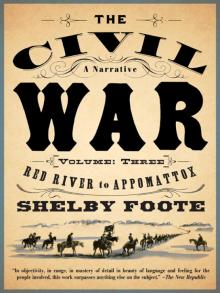 The Civil War: A Narrative: Volume 3: Red River to Appomattox
The Civil War: A Narrative: Volume 3: Red River to Appomattox The Civil War: A Narrative: Volume 1: Fort Sumter to Perryville
The Civil War: A Narrative: Volume 1: Fort Sumter to Perryville Jordan County
Jordan County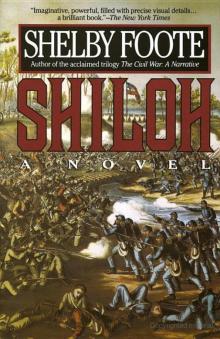 Shiloh
Shiloh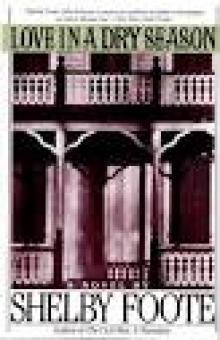 Love in a Dry Season
Love in a Dry Season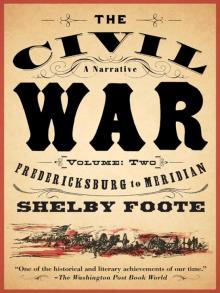 The Civil War: A Narrative: Volume 2: Fredericksburg to Meridian
The Civil War: A Narrative: Volume 2: Fredericksburg to Meridian Chickamauga
Chickamauga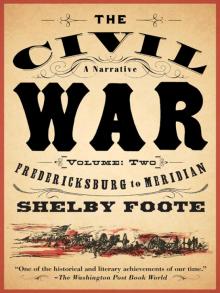 The Civil War: A Narrative: Fredericksburg to Meridian
The Civil War: A Narrative: Fredericksburg to Meridian